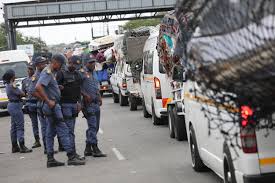The recent escalation of protests in Mozambique has created severe disruptions, leaving hundreds of truckers stranded and impacting the flow of goods between Mozambique and South Africa. With tensions rising, this situation highlights not only regional instability but also the vulnerabilities in cross-border trade that South Africa relies on.
1. The Roots of the Protests
The protests in Mozambique began as a response to rising fuel prices, high inflation, and dissatisfaction with government policies. Citizens in cities like Maputo and Beira have taken to the streets to express their grievances, calling for urgent change. The situation has intensified as the government struggles to address the demands of its people, causing tensions to spill over into violent demonstrations.
2. Impact on Truckers and Transport Routes
As protests have intensified, transport routes that are crucial for goods movement, including fuel and essential commodities, have been blocked. Hundreds of South African truckers are now stranded, unable to continue their routes or return home. Many of these drivers have reported being stuck without adequate access to food, water, or safe shelter, raising serious safety concerns.
3. Consequences for South Africa’s Economy
The ripple effects of Mozambique’s crisis are being felt in South Africa. Mozambique is one of South Africa’s significant trade partners, with daily shipments of agricultural products, mining goods, and fuel crossing the border. The halt in transportation has affected supply chains and caused delays, leading to increased costs for South African businesses and potential shortages in sectors that rely on imported goods.
4. Safety Concerns for Truck Drivers
The security of truck drivers is a pressing concern as many of them face threats of violence due to the unrest. Trucking associations in South Africa have urged the government to work with Mozambique to provide safe passage or assistance to stranded truckers. These drivers, who are critical to the supply chain, require urgent intervention to ensure their safety during this volatile period.
5. Government Response and Calls for Assistance
The South African government has been working with Mozambican officials to resolve the situation. The Department of International Relations and Cooperation (DIRCO) is reportedly in communication with Mozambican authorities, pressing for measures to secure the safety of South African citizens. The Road Freight Association (RFA) has also issued statements urging governments on both sides to take immediate action to restore order and ensure the safe return of stranded drivers.
6. Possible Solutions to Cross-Border Transport Vulnerabilities
This crisis has highlighted the risks that come with relying heavily on cross-border trade routes in volatile regions. There have been calls for increased security measures along these transport routes, as well as discussions on improving South Africa’s rail infrastructure to reduce dependence on road transport in high-risk areas. Strengthening security protocols could help mitigate risks for both the drivers and the goods they transport.
As the protests in Mozambique continue to disrupt the lives of South African truckers and hinder the flow of goods, this crisis serves as a stark reminder of the interconnectedness of regional stability and economic well-being. Both countries must work together to resolve these issues and ensure the safety of the individuals who keep our supply chains running.

